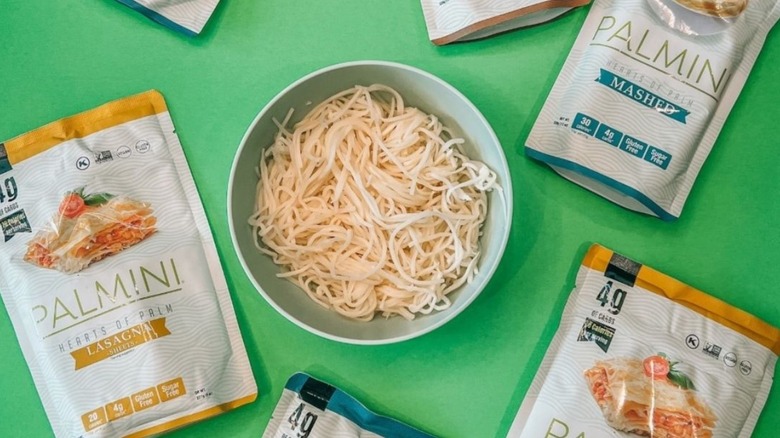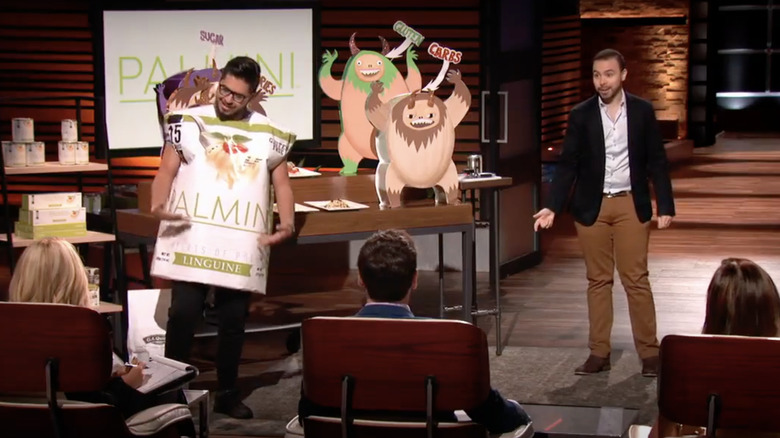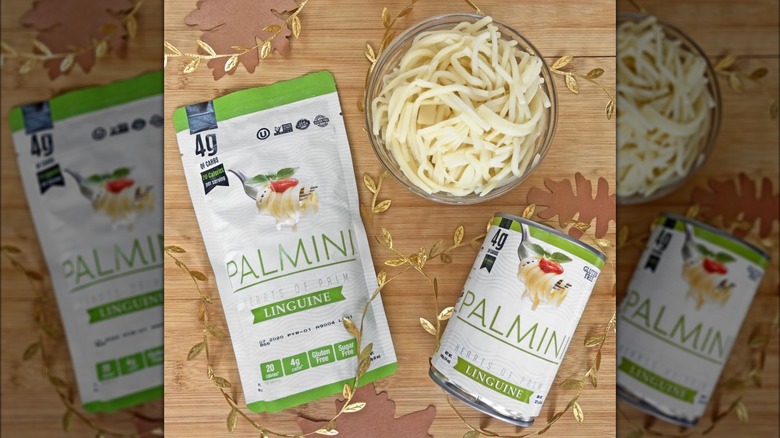Here's What Happened To Palmini After Shark Tank
Whether you are trying to watch your carb intake or just want to eat more veggies, vegetable-based substitutes are a great alternative to some of your favorite wheat-based dishes. If you regularly grocery shop, we're sure you've spotted products like cauliflower rice, zucchini noodles, or one of the many other vegetable substitutes for rice, pasta, and pizza dough at the grocery store, maybe even trying out some of the more appetizing looking options. With so many in-store products and homemade options available, you may be wondering if you really need another packaged or canned pasta substitute. Well, Alfonso Tejada thought so. After years of importing products like quinoa and chia seeds, he pitched his new Palmini brand to the investors on "Shark Tank" during Season 9 Episode 24, which aired in February of 2018.
The Palmini product he pitched was a pasta substitute made from hearts of palm, which is a vegetable that comes from inside palm trees and is often found in salads, stir-fries, and marinated as a side dish or on a charcuterie board. A serving of Tejada's gluten-free pasta substitute contains 20 calories per serving, 4 grams of carbs, and is sugar-free, vegan, and keto-friendly, making it suitable for many diets. The brand has also acquired BPA-Free and Non-GMO certifications.
During the episode, Tejada faced sharks Lori Greiner, Mark Cuban, Bethenny Frankel, Robert Herjavec, and Daymond John, opening with a bit of humor to warm up the investors. His costumed mascot entertained the celebs by acting out Palmini "defeating" the sugar, carbs, and gluten found in regular, wheat-based pasta. While the sharks applauded his opening, convincing them to invest wasn't so easy.
Palmini meets the sharks
The sharks sampled three dishes made with the Palmini products, all reacting a little differently. Robert Herjavec immediately expressed disappointment that it "didn't taste like pasta," while Lori Grenier was a fan, tweeting, "I really loved the taste of Palmini!!" During Tejada's pitch, Bethenny Frankel and the other entrepreneurs debated whether the brand has long-term potential in classic shark style. Frenkel expressed concern that, since the product was basically vegetables cut into a pasta-like shape, it was unclear whether the patent-pending technology would be sufficient to stand up to potential future competition. Eventually, Mark Cuban and Lori Greiner came through and made an offer of $300,000 for 25% equity. This was more than the 10% Tejada had wanted to give, but a compromise from the 30% the two sharks originally proposed.
Tejada, who went to college at the University of Florida, told the school's publication The Alligator he had only sold a couple of Palmini products per day before he appeared on "Shark Tank." Within a day of the episode airing, he claims to have sold out of stock entirely. "It's incredible how fast we ran out ... " he said. "We're planning on restocking and then we'll see how sales go afterwards."
While Palmini received an initial "sharknado" of sales, that sadly doesn't always spell success for companies featured on "Shark Tank." It remained to be seen whether the deal with Grenier and Cuban would lead to a sustainable future.
Palmini continues to grow
It appears Palmini is still going strong, with a growing product line that now includes angel hair pasta, lasagna, and linguine. The brand also expanded into other hearts of palm-based low-carb products like "rice" and a mashed potato substitute. The products come in both pouches and cans for shoppers' convenience. In addition, quinoa, chia, and llajua sauce are available under the brand Greenfit, which is also sold on the Palmini company website and owned by the same parent company, O.A. Foods. Several nationwide grocery chains carry Palmini products including Safeway, Kroger, Walmart, Sprouts Farmers Market, and Market of Choice.
Dietitian Amy Keating, RD told Consumer Reports, "Considering most Americans don't consume nearly enough vegetables daily, replacing hearts of palm for regular pasta is a great way to increase veggies in your diet." Though the consumer publication expressed concerns about whether the product is sustainable, Palmini claims its products are made using cultivated palm sourced from Ecuador. The company grows and harvests the hearts sustainably and without killing the plant, allowing it to regrow and be harvested again. For consumers looking for more eco-friendly packaging, the cans are made with aluminum, which is recyclable.
Palmini has a fairly active social media presence, suggesting the brand is still in the game years after that Shark Tank pitch. Fans can discover new recipes for foods like Thai chicken salad, shrimp fried "rice," and fritters, as well as cooking tips through the brand's TikTok, Instagram, and other social media profiles.


